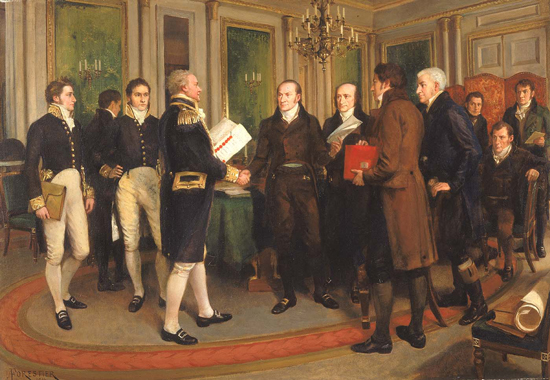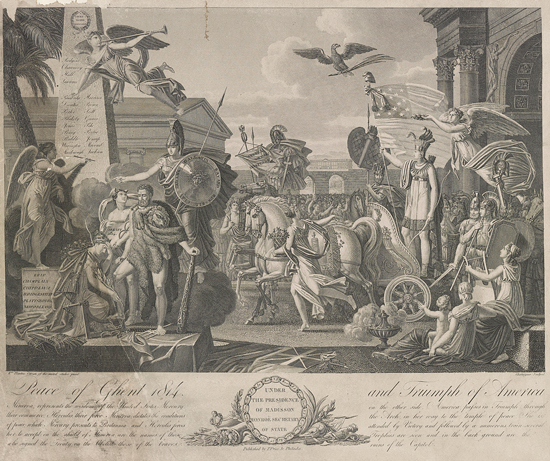|

Handshake at Ghent — Admiral Lord Gambier and John Quincy Adams
Treaty of Ghent 1814
Ghent is a city in Belgium.
The Treaty of Ghent was signed on December 24, 1814,
hence also called the Peace of Christmas
Eve. It was negotiated to end the
 War of 1812.
War of 1812.
The treaty was
concluded between Great Britain and the United States.
Negotiations at Ghent lasted from
August 8 to December 24, 1814, and were overshadowed by the
 Congress of Vienna, which
assembled from September 1814 to June 1815 and discussed the future
of Europe after Napoleon had a go at it.
Congress of Vienna, which
assembled from September 1814 to June 1815 and discussed the future
of Europe after Napoleon had a go at it.
This was the reason why Great Britain
could only sent its B-team to Ghent, which, in turn, was the reason
why the United States won, if not the war, but these negotiations.
Image Above
British and
American diplomats signed the Treaty of Ghent on
December 24, 1814.
Left to right:
British delegates:
Anthony St. John
Baker (Secretary) Baker later
exchanged ratifications with U.S. President
Madison.
 Check this event in
the timeline of the War of 1812
Check this event in
the timeline of the War of 1812
William Adams
(Plenipotentiary) (or Henry Goulburn)
Henry Goulburn
(Plenipotentiary) (or William Adams)
Admiral Lord
Gambier (Chief Plenipotentiary)
American
delegates:
 John Quincy Adams
(Chief Plenipotentiary)
John Quincy Adams
(Chief Plenipotentiary)
Albert Gallatin
(Plenipotentiary)
Christopher Hughes
(Secretary)
James A. Bayard
(Plenipotentiary)
[unknown] (or Henry Clay)
Henry Clay
(Plenipotentiary) (or Jonathan Russell)
Jonathan Russell
(Plenipotentiary) (or unknown)
Oil on canvas by
Sir Amèdée Forestier, who created this artwork
in 1914.
Smithsonian
What Did the Treaty of
Ghent Decree?
It restored the status quo ante
bellum, the state that existed before the
 War of 1812.
War of 1812.
This included
the state that existed with regards to the
Native American tribes in 1811, before the
 Battle of Tippecanoe.
In other words, land that then belonged to the
Indians was returned to them.
Battle of Tippecanoe.
In other words, land that then belonged to the
Indians was returned to them.
However, in some instances developments were irreversible:
:: The Floridas
The U.S. took
advantage of Spain's weakness that resulted
from her involvement in the Napoleonic Wars
and annexed
 Spanish West Florida
bit by bit. This would result in the
Spanish West Florida
bit by bit. This would result in the
 Adams-Onís Treaty
in 1819, and
in July 1821, Florida would become a U.S.
territory.
Adams-Onís Treaty
in 1819, and
in July 1821, Florida would become a U.S.
territory.
:: The Native Americans
Resistance by
the Indians was broken. After the War of
1812, they could never again recover to
fight for themselves in a way that would
present a serious threat to the U.S. Britain
was no longer a possible ally and, to make
matters worse, the Treaty of Ghent failed to
allot land for the natives.
What else was agreed upon?
Great Britain
was allowed to hang on to the Passamaquoddy
Islands until their rightful ownership was
established.
Three
commissions were created to
determine the Canadian-American border and
the Passamaquoddy Islands issue.
Britain declared the slave trade
illegal from May 1, 1807, and the U.S. declared the slave trade
illegal from January 1, 1808. In the Treaty of Ghent, both nations
promised to work toward the abolition of the slave trade.
Britain abolished slavery from August
1, 1834.
The U.S. abolished slavery from
December 6, 1865.
For more see also
 Slavery and Abolition.
Slavery and Abolition.
None of the
maritime issues that triggered the War of 1812
were mentioned in the Treaty of Ghent. These
issues were dropped as a condition for peace,
which was a good thing because there was no hope
of either side budging on neutrality at sea or
 impressment.
impressment.
In 1815, the
engraver Alexis Chataigner couldn't help himself
and went monumental.

Peace of Ghent 1814 and Triumph of America
Print is
allegorical reference to the Treaty of Ghent
which ended the War of 1812, showing Minerva,
Roman goddess of war, dictating the terms of
peace, which Mercury, Roman messenger of the
gods, delivers to Britannia and Hercules, Roman
bodybuilder, compels her to accept.
Engraving
by Alexis Chataigner / Library of Congress
More History
|